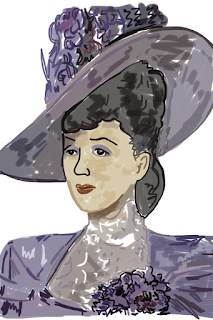Another Entry in my Continuing Series on Germans and German-Americans in Cinema
Director Elia Kazan's "East of Eden" is remembered primarily for James Dean's method acting. This Cain and Abel story of two brothers, Cal (Dean) and Aron competing for the love of their father, Adam (Raymond Massey) and a girl (Julie Harris) is set in the early years of World War One. Cal is perhaps the "bad" son, rebellious, while Aron is considered "good."
A significant subplot involves the small framing town's reaction to German-Americans who live and work among them.
Gustav Albrecht (played by character actor Harold Gordon), a friend of Cal Trask and his family, is a shoemaker. He speaks with a German accent that some in the town find amusing but not threatening. Early in the film, amidst the patriotism that came when the Dough Boys first leave to fight, Gustav (or Gus, as some call him) is a trusted member of the community.
But as the war drags on and more young boys are called up to fight, and replace the soldiers who have died, Gus's problems begin to mount.
Early in the film Gus and the Trasks begin worrying about rising tensions. Gus expresses his disbelief at the war being Germany's fault, and when confronted with rumors of German atrocities he says "it's not true, especially for the good Germans."
As new recruits march through the town, a rock is thrown through Gus's shop window as someone yells for him to "go home."
At a carnival, a soldier gives a recruitment speech, mentioning "atrocities of the Hun." Listening, Gus says they are "lies, all lies," and another person in the audience says "there's that German again, I'ld like to give him a piece of my mind."
A group follows Gus and try to get him alone by offering to buy him a drink - Gus calls one of them a "schweinhund" and pushes him. The crowd, now a mob, follow Gus home and trample his prize rose bushes.
Cal's brother Aron tries to placate the mob by reminding them they like Gus and his funny accent, but then someone presents Gus with a telegram reporting the death of a townswoman's son. She accuses Gus of not being sorry, then of not being sorry enough. A towns person says he is tired of Aron "sticking up for" the German, and questions Aron's patriotism because he hasn't enlisted yet.
The mob begins destroying the property, ripping up fences, as someone yells to Gus "this'll make you sorry."
Cal shows up and immediately pushes his way to Gus, and begins punching. The sheriff shows up before things get too violent. He calls everyone by name, calming the situation by subtly reminding everyone they were once all friends. He tells Gus someone owes him an apology.
This film presents many contemporary issues for Germansn and German-Americans, in 1955. Gus the comedic German, with a comical accent; Gus reaffirming his patriotism as a recent immigrant; and Gus having to defend his home country, and in effect his own recent past. It's interesting that Gus never stops defending Germany. His opinions that Germany wasn't the cause of the war, or guilty of atrocities to the extent claimed, put him in a minority in 1917, and in stark contrast to the more recent events of World War Two.
I don't know how audiences would have reacted to Gus in 1955. Would they be sympathetic to him, as many people thought Germany was responsible for World War One, just as it was for World War Two? Or would they see the complexity of his situation, an immigrant who once fit in, now turned against because not of who he is, but simply because of where he was born?
It's an interesting subplot. Germans and Germna-Americans on film in the 1950s often had to deal with the recent past, addressing the idea that they are or were "good" Germans, as opposed to the "bad" ones responsible for the war. The prejudice Gus faces because of his birth reflects on Cal's identity of being the "bad" son, as opposed to the "good" Aron. Is someone good or bad because of their birth? Gus thinks not, and the film proves Cal maybe isn't bad either.
















































